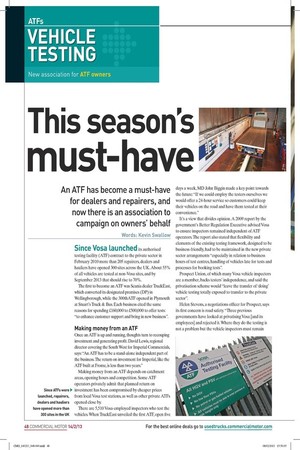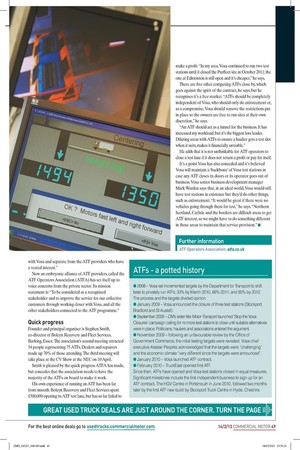This season's must have
Page 29

Page 30

If you've noticed an error in this article please click here to report it so we can fix it.
An ATF has become a must-have for dealers and repairers, and now there is an association to campaign on owners behalf Words: Kevin Swallow Since Vosa launched its authorised testing facility (ATF) contract to the private sector in February 2010 more than 205 repairers, dealers and hauliers have opened 300 sites across the UK. About 55% of all vehicles are tested at non-Vosa sites, and by September 2013 that should rise to 70%.
The first to become an ATF was Scania dealer TruckEast, which converted its designated premises (DP) in Wellingborough, while the 300thATF opened in Plymouth at Stuart's Truck & Bus. Each business cited the same reasons for spending £160,000 to £500,000 to offer tests: "to enhance customer support and bring in new business".
Making money from an ATF Once an ATF is up and running, thoughts turn to recouping investment and generating profit. David Lewis, regional director covering the South West for Imperial Commercials, says: "An ATF has to be a stand-alone independent part of the business. The return on investment for Imperial, like the ATF built at Frome, is less than two years."
Making money from an ATF depends on catchment areas, opening hours and competition. Some ATF operators privately admit that planned return on ■ investment has been compromised by cheaper prices from local Vosa test stations, as well as other private ATFs opened close by.
There are 5,510 Vosa-employed inspectors who test the vehicles. When TruckEast unveiled the first ATF, open five days a week, MD John Biggin made a key point towards the future: "If we could employ the testers ourselves we would offer a 24-hour service so customers could keep their vehicles on the road and have them tested at their convenience."
It's a view that divides opinion. A 2009 report by the government's Better Regulation Executive advised Vosa to ensure inspectors remained independent of ATF operators. The report also stated that flexibility and elements of the existing testing framework, designed to be business-friendly, had to be maintained in the new private sector arrangements "especially in relation to business hours of test centres, handling of vehicles late for tests and processes for booking tests".
Prospect Union, of which many Vosa vehicle inspectors are a member, backs testers' independence, and said the privatisation scheme would "leave the transfer of 'doing' vehicle testing totally exposed to transfer to the private sector".
Helen Stevens, a negotiations officer for Prospect, says its first concern is road safety. "Three previous governments have looked at privatising Vosa [and its employees] and rejected it. Where they do the testing is not a problem but the vehicle inspectors must remain with Vosa and separate from the ATF providers who have a vested interest."
Now an embryonic alliance of ATF providers, called the ATF Operators Association (ATFA) has set itself up to voice concerns from the private sector. Its mission statement is: "To be considered as a recognised stakeholder and to improve the service for our collective customers through working closer with Vosa, and all the other stakeholders connected to the ATF programme."
Quick progress Founder and principal organiser is Stephen Smith, co-director of Boleyn Recovery and Fleet Services, Barking, Essex. The association's second meeting attracted 54 people representing 75 ATFs. Dealers and repairers made up 70% of those attending. The third meeting will take place at the CV Show at the NEC on 10 April.
Smith is pleased by the quick progress ATFA has made, but concedes that the association needs to have the majority of the ATFs on board to make it work.
His own experience of running an ATF has been far from smooth. Boleyn Recovery and Fleet Services spent £500,000 opening its ATF test lane, but has so far failed to make a profit. "In my area, Vosa continued to run two test stations until it closed the Purfleet site in October 2011; the one at Edmonton is still open and it's cheaper," he says.
There are five other competing ATFs close by, which goes against the spirit of the contract, he says, but he recognises it's a free market. "ATFs should be completely independent of Vosa, who should only do enforcement or, as a compromise, Vosa should remove the restrictions put in place so the owners are free to run sites at their own discretion," he says.
"An ATF should act as a funnel for the business. It has increased my workload, but it's the biggest loss leader. Diluting areas with ATFs to ensure a haulier gets a test slot when it suits, makes it financially unviable."
He adds that it is not unthinkable for ATF operators to close a test lane if it does not return a profit or pay for itself.
It's a point Vosa has also conceded and it's believed Vosa will maintain a 'backbone' of Vosa test stations in case any ATF closes its doors or its operator goes out of business. Vosa senior business development manager Mark Warden says that, in an ideal world, Vosa would still have test stations in existence but they'd do other things, such as enforcement. "It would be great if there were no vehicles going through them for test," he says. "Northern Scotland, Carlisle and the borders are difficult areas to get ATF interest, so we might have to do something different in those areas to maintain that service provision." • Further information I ATF Operators Association: atfa.co.uk ATFs - a potted history • 2008— Vosa set incremented targets by the Department for Transport to shift tests to privately run ATFs; 33% by March 2010, 66% 2011, and 85% by 2012. The process and the targets divided opinion.
• January 2009— Vosa announced the closure of three test stations (Stockport, Bradford and St Austell).
• September 2009— CM's sister title Motor Transport launched 'Stop the Vosa Closures' campaign calling for no more test stations to close until suitable alternatives were in place. Politicians, hauliers and associations entered the argument.
• November 2009— following an unfavourable review by the Office of Government Commerce, the initial testing targets were revisited. Vosa chief executive Alastair Peoples acknowledged that the targets were "challenging" and the economic climate "very different since the targets were announced".
• January 2010— Vosa launched ATF contract.
• February 2010— TruckEast opened first ATE Since then, ATFs have opened and Vosa test stations closed in equal measures. Significant milestones include the first independent business to sign up for an ATF contract, The HGV Centre in Portsmouth in June 2010, followed two months later by the first ATF new-build by Stockport Truck Centre in Hyde, Cheshire.






























